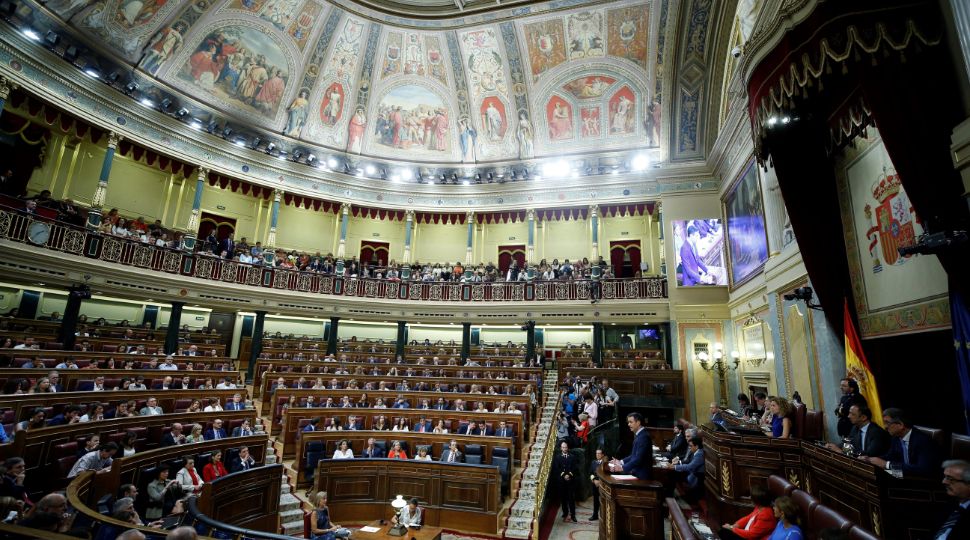The Role of Unidas Podemos in the Formation of the Next Spanish Government

Despite winning the election on 28 April, the Spanish Socialist Workers’ Party (PSOE) didn’t gain enough seats in congress to establish a majority government. For two months, its leaders have declared they want to establish a minority government and they started to negotiate a coalition with UP only a few days before the first vote in the new parliament. However, they didn’t reach a compromise. According to Spain’s constitution, if the government can’t achieve a vote of confidence by 23 September, early elections must be held, this time for 10 November.
UP’s Profile
The party is composed of smaller left-wing and regional parties and was established in 2016. It has its own electoral committee and 42 MPs in congress, which numbers 350 in total. The majority of the UP MPs are members of Podemos, the party established in 2014 as a protest against budget cuts of successive governments. UP consists also of the communist United Left (IU), the Green party Equo, Catalan regionalists from En Comú Podem, and the Galician party En Marea. The UP is also fighting for women’s votes. On 8 March, the party changed its name from Unidos Podemos—masculine—to Unidas Podemos—feminine.
The UP’s programme is a synthesis of left-wing, regionalist, and anti-American demands. Its members call for increased state spending on education and healthcare and for early retirement for people with 35 years’ of work experience. They also want to tax financial transactions, big fortunes, banks, and digital companies. They advocate for the federalisation of the country and to establish an agreement between the Spanish and Catalan governments to organise a legal referendum on the independence of Catalonia. In foreign policy, they propose the gradual replacement of NATO by a European army and for the EU to be independent of the U.S. In their opinion, the Union’s dependence on American policy is expressed in, for example, the sanctions on Russia and support for Juan Guaidó in Venezuela.
Podemos is suspected by outsiders of affiliations with non-democratic regimes. Although, the Spanish Court of Auditors investigated party financing in 2015-2016 to determine whether any of it was illegal, it didn’t identify any mismanagement. But during the investigation, Spanish media disclosed that Venezuela’s finance minister had disclosed the transfer of €7 million euro to a foundation headed by the leader of Podemos, Pablo Iglesias. Moreover, in 2015, The Economist put the party on a list of ones sponsored by Russia. Furthermore, since 2013, Iglesias has been hosting a programme on Hispan TV, a television outlet owned by the Iranian government.
Relations between PSOE and UP
Since Podemos’s formation, its relations with PSOE have been confrontational. Podemos accused the Socialists of corruption and PSOE criticised Podemos as populist. Mutual distrust was why PSOE, Podemos, and the liberal Ciudadanos (Cs) were unable to form a government after the 2015 parliamentary elections. As a result, there were early elections in 2016—the first one held with a UP committee. Everything changed in June 2018 when PSOE and UP won a constructive vote of no confidence in the government of the right-wing Peoples Party (PP). Since then and to April 2019, UP had been a loyal partner of the PSOE minority government. In autumn 2018, Iglesias even tried to negotiate with Catalan separatist MPs to support the Spanish budget for 2019, which they had opposed previously. At the same time, PSOE and UP co-govern five of 17 regions of Spain.
Agreement between the left-wing formations is more difficult because they fight for the same electorate. Many UP voters are former Socialists. PSOE is winning them back because of its left-wing policies. Since the establishment of the Sánchez government in June 2018, UP support has decreased from 18% to 13% while PSOE support has increased from 22% to 32%. Despite the risk of a further loss of voters, UP has declared its intention to support the government in return for the positions of deputy prime minister and five ministries. In July, PM Pedro Sánchez offered UP the positions of deputy PM and three ministries—labour, healthcare, and science. Iglesias accepted this offer on 20 August but the Socialists said it had come too late and returned to trying to form a minority government.
There is disagreement inside UP about its cooperation with PSOE. A few days after July’s second vote, the leaders of IU and Equo announced that they would try to persuade the rest of UP to support PSOE but only in return for policy agreement. But Podemos and En Comú Podem are still negotiating to establish a coalition with the Socialists for both policy agreement and ministries.
The Context of the Negotiations. There is no tradition in Spain of coalitions at the national level. Since the democratic transition in the late 1970s, the party that governs has always been the one that wins the election, even if it didn’t have an absolute majority in parliament. The domination of PP and PSOE in the political spectrum in 1989-2015 favoured single-party governments; but, the election results for Podemos/UP and the Cs since 2015 have made the creation of single-party governments more difficult.
Centre and right-wing parties refuse to cooperate with PSOE. PP and the conservative Vox criticise every step of the Socialists. The Cs also declared its members would vote against the Sánchez government because they accuse him of collaboration with the Catalan separatists. All three parties hope to improve their results in the next early elections. In repeated elections in 2016, the turnout was about 4% lower than in 2015; the centre-right electorate is less susceptible to abstention than left-wing voters.
The majority of regional parties will support the government only if UP participates in it. This includes 25 MPs of the Basque Nationalist Party (PNV), the Unity of the Basque Country (EH Bildu), Catalan Republican Left (ERC), and Compromis from Valencia. The separatist parties, EH Bildu and ERC, hope that a government with UP will be more open to a dialogue about the independence of Catalonia and Basque Country. PNV and Compromis expect UP support to increase the power of their regional communities.
Conclusions
Sánchez wants to divide the support for UP and lead to the marginalisation of this formation. He will use internal divisions inside the party to achieve this goal. The leaders of IU and Equo realise that their parties are not significant enough to win ministerial positions and they are afraid of losing seats after early elections because of a further decrease in UP support. However, the failure of negotiations may let Podemos build a new formation with regional parties, also with separatist parties. The establishment of this kind of alliance could increase political instability in Spain.
Given all this, there are three possible scenarios. In the first, UP supports PSOE only in return for policy agreement. The risk of recurring political crises increases. UP would try to find an opportunity to go into opposition in every situation in order to force the government to change its policy. The second scenario is a coalition government with minor participation of UP, for example, just two ministers. This would let PSOE control its partner and gradually win over UP voters. The third scenario is to call for early elections. It is unlikely that PSOE will win an absolute majority, so the growing pressure to establish a government will force an agreement with UP on less profitable conditions for the Socialists than now.
The most probable scenario is the establishment of a government with minor UP participation. The main implication of this solution will be an increase in the budget deficit, which may lead to disagreement between Spain and the European Commission. UP may also persuade the government, together with other countries, to oppose the sanctions on Russia or to reduce the number of Spanish soldiers participating in NATO missions. However, these are unlikely to come to fruition because foreign policy will be retained by PSOE.


